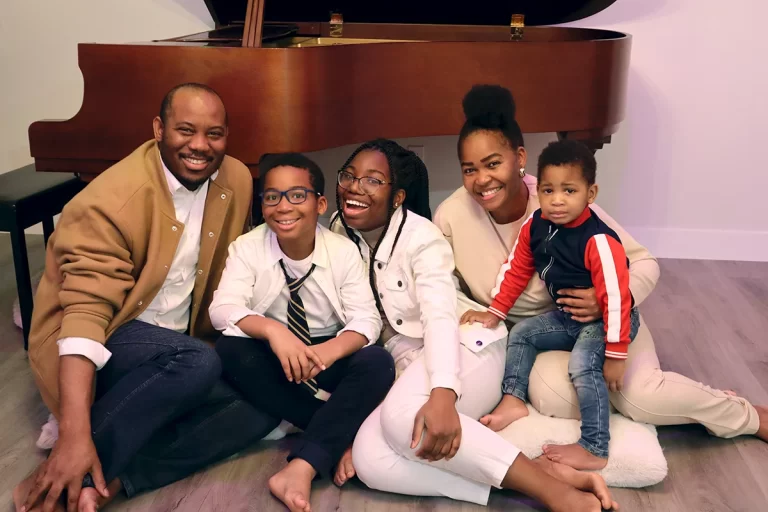
If you take a look at the most successful TV shows throughout history, consistently at the top of the charts are shows that have to do with family … This is Us, Modern Family, Parenthood, Family Ties, All in the Family, The Simpsons, Family Guy … Why are they so historically and consistently successful? In part because we can all relate to them in some way on a personal level … we all experience levels of family drama in our lives. Now, I realize looking at TV isn’t the best example of discovering how we’re to identify and become the sacred family that God has called us to, so I started looking throughout the Bible. The first family we’re introduced to is Adam and Eve with their sons Cain and Abel. In just the opening chapters we read that Cain kills Abel … We’re four humans in and one of them kills another. In fact, if you follow along throughout the whole Biblical narrative it doesn’t get much easier from there as family relationships are in crisis mode from the beginning.
Yet, family is designed to be a source of sacred moments and memories, of safety and security, beauty and blessing, love and support. Family is such a sacred relationship that God has chosen this familial metaphor to describe and define His connection with His people. Not only do our families shape our relationship with God; they have profound potential to impact our society. Pope John Paul II understood this when he said, “As the family goes, so goes the nation and so goes the whole world in which we live.” This is why it’s so important to understand the ways in which sacred families are to be designed.
When God began shaping His people He hand-wrote the parameters by which our lives are to be defined; we call them the 10 Commandments. The first four are all about defining our vertical relational orientation – the way in which we are to love God. The following six are all about defining our horizontal relational orientation – the way in which we are to love the world around us. That order may in fact sound familiar … after all, the greatest commandment is, “Love the Lord your God” and the second is like it: “Love your neighbour as yourself.” The first of the six commandments that are to define our horizontal relationships is this:
“Honour your father and your mother, so that you may live long in the land the Lord your God is giving you.” (Exodus 20:12, NIV)
This reveals that the starting point for all of our horizontal relationships is deeply impacted by the parental relationship we have or don’t have. Therefore, we learn our authority, our respect, and our ‘reverence’ for others out of the relationship we have with our parents. For some this is a great thing and for others it’s a source of deep difficulty. Our relationship with our parents is the very training ground upon which every other relationship finds its root. If you have a healthy relationship with your parents, many other relationships will likely fall into place. If there are difficulties, you may just find other relationships a little bit more difficult. It’s here where we learn love, support, encouragement, forgiveness, grace, kindness, or, at times, a lack thereof. God has set it up so that the way in which we relate to our father and mother will directly shape, colour, and impact the way in which we relate to Him and others.
What does honour even mean?
The dictionary says this: Honour (verb): [än-ər] : To show great respect for someone.
The Biblical word for honour provides further clarity … Kabad, the word translated most frequently in the Bible as “honour” means “to be heavy, weighty … to give reverential respect.” Interestingly, the same word is also translated 14 times in the Bible as “glory,” which paints the picture that we honour someone by showing respect, reverence, love, obedience, and support. This idea of honouring someone is so prestigious and such a lofty command that in all of the Pentateuch (the first 5 books of the Bible) we’re told to honour only two things: God and parents. Whoa.
Why does honouring our parents matter?
Well, outside of the reality that these are called the 10 Commandments and not the 10 Suggestions, there are many reasons. The way we treat our parents matters deeply to God; there are profound implications and ramifications. Romans 13 tells us that we are to be a people who are “subject to the governing authorities, for there is no authority except that which God has established.”
Submission and authority in the same sentence?! Two words we’re less fond of than we’d like to admit. The message is clear, though … All legitimate authority – including parental authority – is derivative. Which means there is an intrinsic trickling-down flow with authority. Authority originates and comes from God, is extended to parents, and is meant to be honoured by children. Therefore, we honour God by honouring that which He has instituted and those He has placed in positions of influence. We come to see in this that a blatant disregard and disobedience to this command ultimately (and perhaps unsurprisingly) reveals a submission issue. And a submission issue is always a heart issue. But God in His kindness loves us enough to always address our heart issues – He wants us to be free! This is why His desire is always for us to submit our hearts to Himself – and one of the ways this is lived out is by honouring our parents.
How does honour happen?
The first thing we need to understand is that honouring someone is a choice. Honouring someone isn’t blind obedience or habitual action; it’s a participatory choice we make. Isaiah 29:13 says, “These people come near to Me with their mouth and honour Me with their lips, but their hearts are far from Me.” There can be a disassociation between our actions and our honour – we must choose to actively honour someone. Honouring someone is more than mere lip service … God’s call for us to honour our father and mother is a call to action.
Practically speaking, in the same way all people receive and feel love differently, people feel honoured in different ways. While writing this I called my parents and asked them how they feel honoured … Their answers were important and they were different. My mom, in considering their different answers, reflected wisely that it comes down to their love languages; to how they are wired to receive and feel love. So, if you’re not sure how to honour your parents, the best way is to start by asking and then listening … and then doing! I imagine just asking them how you can honour them would get the ball rolling for you – they’d likely start to feel honoured just by the question. Ultimately, we should seek to honour our parents the same way that we do God – in our thoughts, in our words, and in our deeds.
Honouring in hard circumstances
Within our community there are many unique and varied expressions of relationship between parent and child. For some of us honouring parents is more natural, while for others in our midst it’s painful to even think about the idea. Let me just offer a few quick points on honouring when it’s hard.
The first thing I want to say is I believe God will bless you in the journey. I’m sure there are complex combinations of emotions, perhaps including grief, hurt, pain, guilt, or disappointment. I can’t imagine what reading through this must be like. I pray that our Heavenly Father can help redefine and reorient for you what a parent can be. There’s not a relationship on earth that God’s unaware of and there’s not a family situation on earth right now beyond the power of Jesus’ reconciliation and redemption. One of the great encouragements to me in this area is actually the genealogy of Jesus … If you know the stories you know there is much hurt, pain, drama, and turbulence – yet that very family, with the presence of Jesus, became the definition of a sacred family … A sacred family is made possible by the presence of Jesus.
Secondly, I want to mention that even in hardships, honouring our parents ultimately comes down to the derivative authority that I mentioned earlier. We honour our father and mother based not upon their performance but rather on position.
With that said, here are a few important distinctions to make.
Honouring our parents doesn’t mean blind obedience, nor does it mean honouring dishonourable choices. Ephesians 6:1 is helpful: “Children, obey your parents in the Lord.” The Bible is clear – we’re to obey our parents in the Lord – if you read through 2 Timothy 3 or Romans 1 you’ll see just how seriously God views disobedience to parents. Yet, Paul clarifies that it’s obedience to our parents “in the Lord” –which means we’re not to obey our parents if it’s in contradiction to honouring God. We’re not to honour dishonourable choices; in fact, sometimes the most honourable thing we can do is put up healthy boundaries, have honest conversations, and not allow certain behaviors to continue. Honouring our parents means acknowledging hurts, pains, disillusionments, and staring them right in the face in order to address them, to have God heal them. Honouring parents does not mean allowing for ongoing abuse or manipulation – in some heart-breaking situations the most honourable thing we can do is to remove ourselves from a situation – to protect ourselves.
So what do we do in these types of situations?
You can fulfill the call to honour and to a sacred family by offering, extending, or accepting forgiveness and by praying. Jesus’ words to “bless those who curse you, pray for those who mistreat you” (Luke 6:28) are a call to courageous honour; to stand in the face of hardship or pain and yet choose to stand and walk in the way of humility, love, honour … the way of the cross. It’s important to note that to extend or accept forgiveness is not the same thing as naively restoring relational trust. Rob Reimer writes, “… trust is earned … and while forgiveness is unilateral, reconciliation is bilateral. It requires both parties to fully participate.” Forgiveness is not an option for those wanting to follow the call of Jesus – it’s a command. However, after forgiveness is given, God’s guidance is needed to move onwards in relationship and wisdom.
Finally…
I’m not ignorant or naïve to the fact that there are complexities within some of our families that nobody could ever imagine, perhaps deeply hidden below a façade. I’ve walked through situations with families, with kids, and with parents who are in circumstances that are heartbreaking. Yet, I’m still passionately affirming that whatever family you have, whatever circumstances you find yourself in, a sacred family life is possible for you.
 Here at FAC, we long to be a community committed to “building lives that honour God.” This simply cannot happen without also honouring our parents. God has orchestrated our vertical and horizontal relationships with a reciprocity of blessing. Honouring our father and mother on earth honours our Father in Heaven … and honouring our Father in Heaven will play itself out by honouring our earthly father and mother. The simple truth is we just can’t build a life that honours God without honouring our parents. At the end of the day, may we be a people who honour God and honour our parents … Honour is a choice, forgiveness is possible, and because of Jesus we know that sacred family relationships are possible!
Here at FAC, we long to be a community committed to “building lives that honour God.” This simply cannot happen without also honouring our parents. God has orchestrated our vertical and horizontal relationships with a reciprocity of blessing. Honouring our father and mother on earth honours our Father in Heaven … and honouring our Father in Heaven will play itself out by honouring our earthly father and mother. The simple truth is we just can’t build a life that honours God without honouring our parents. At the end of the day, may we be a people who honour God and honour our parents … Honour is a choice, forgiveness is possible, and because of Jesus we know that sacred family relationships are possible!
“Help me to honour my parents appropriately.
May I remember that the same way I treat them, I may be treated someday.”
– Written by Kyle Trigg, Family Life Pastor. (Family photo by Erik Johnson)



